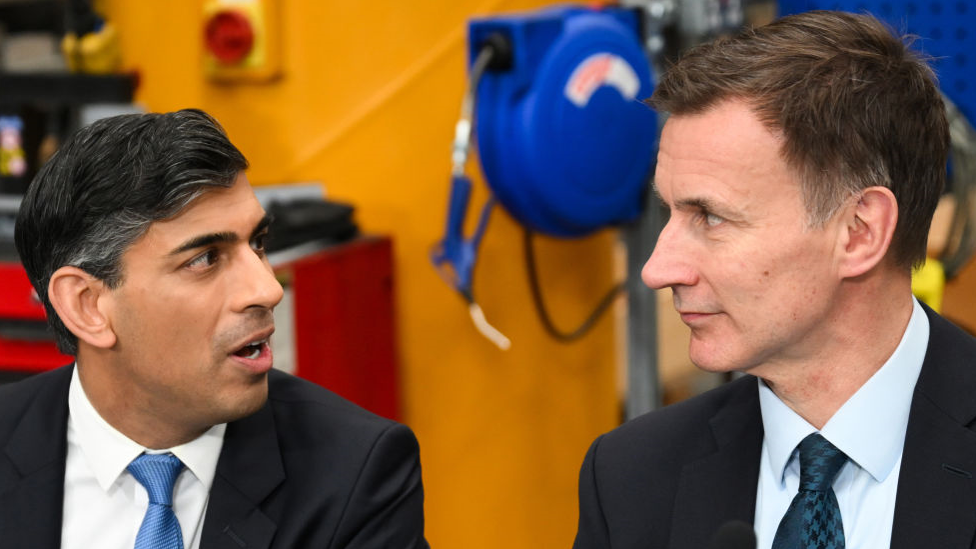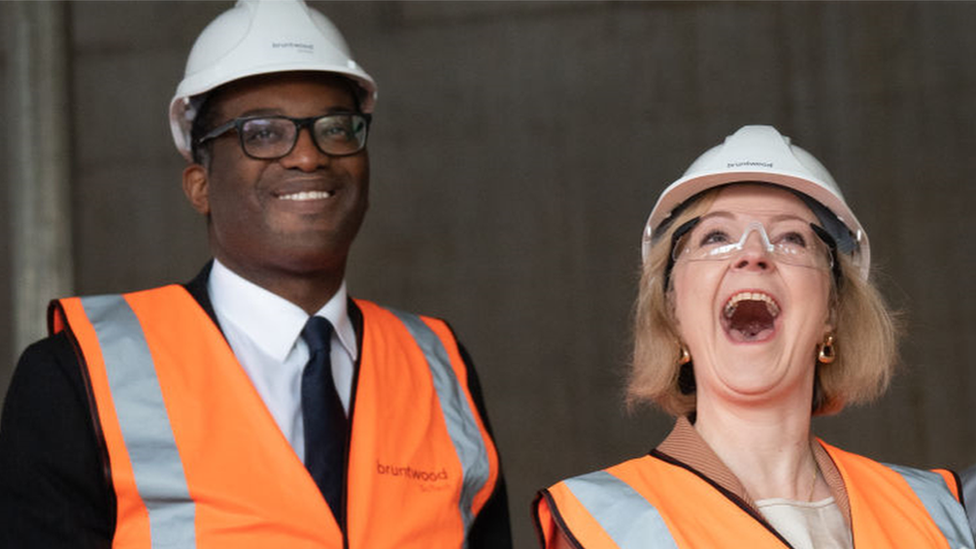Why this won't be the Budget that Jeremy Hunt wanted
- Published

Not where they want to be? Prime Minister Rishi Sunak and Chancellor Jeremy Hunt
This week was supposed to be a major moment in the Conservatives' election campaign.
Chancellor Jeremy Hunt would have stood up in the Commons and delivered the Budget, bringing an end to three years of rolling geo-political and economic crises and multiple inflation shocks.
If all had gone to plan, he would have unveiled a raft of voter-friendly giveaways including tax cuts thanks to a growing economy, falling interest rates and improved public finances.
Instead, the economy is in recession, and Jeremy Hunt and Rishi Sunak do not have the space for a bumper pre-election giveaway. Mr Hunt is not fully in charge of this Budget and his power to make people feel better off and have more money to spend is limited by the decisions of bodies outside of his control.
And while this was supposed to be the last big economic announcement before the next general election, the signs are that voters will have to wait for Downing Street to squeeze in another Budget-like announcement beforehand.
Just an illusion
There had been reason for the government to be optimistic at the start of the year.
Its borrowing costs had fallen sharply, driven by the US central bank suggesting it had no plans to raise interest rates further.
The UK's independent financial watchdog, the Office for Budget Responsibility (OBR), estimated that this could save the government £19bn by 2028-29.
In theory, on a spreadsheet somewhere in the Treasury, the chancellor was looking at "headroom" of about £30bn to spend in the Budget, while still meeting his self-imposed target of getting national debt falling in five years' time.
Homeowners and would-be house buyers were also benefitting from lower borrowing costs which led to a drop in fixed-rate mortgage deals.
This came after inflation - which the Bank of England aims to keep at 2% - dropped significantly to stabilise at 4%. It heralded the hope that the bank may soon cut interest rates which remain at the highest level for 15 years.
But it was a New Year illusion - a mirage for ministers desperate for a rapid uptick in economic and political fortunes.
By February, borrowing costs had begun to rise again. By the middle of last month, the BBC understands that the government's headroom was about back to where it was in November, roughly £13bn.
Turning point
When UK government borrowing costs in the market change so much from month to month that becomes a shaky foundation upon which to base big Budget shifts.
At the same time, official figures showed that the economy had dipped into recession at the end of last year. A shrinking economy is difficult to square with the notion of being at an economic turning point.
When I put this precise point to Hunt a fortnight ago, he acknowledged something that is often left unsaid, that the actions of the Bank of England, rather than the government's will have the biggest impact on the UK economy.
"The turning point will come when inflation falls to its target level of 2% and the Bank of England feels it can bring down interest rates." the chancellor told me. "That is the way that you get real long-term growth."
While the chancellor is careful not to tell the independent Bank of England what to do some of his backbenchers are a little less shy.
Several MPs now tell the Bank's governor, Andrew Bailey, to his face that rates need to be cut immediately because the economy is "flashing red".
Former Business Secretary Jacob Rees-Mogg went as far as suggesting that the Bank's independence should be questioned for "hammering the economy" with high interest rates.
In the more than 25 years since the Bank of England has been granted the power to set interest rates, never has there been as clear a case of what the sitting government would like it to do.
If the chancellor still set interest rates, as they did until 1997, there can be little doubt that two or three rate cuts would be delivered before polling day.
But the Bank of England is cautious about quick cuts. It has signalled that they will come eventually but it wants to be sure that longer-term inflationary pressures have settled in, with slower wage and price rises.
In understanding the chancellor's approach to all of this, it is important to remember the origin story of how he ended up in his job in the first place.
When Hunt was called off his holiday in the middle of the firestorm around the mini-Budget in 2022 - delivered by short-lived Chancellor Kwasi Kwarteng - he first assumed it was a prank call.
But even though he had no real rooting in economics, his mere appointment helped calm wild markets.
The new chancellor reversed almost all his predecessor's £45bn in unfunded tax cuts, re-engaged the sidelined OBR forecasters and remained in place as Liz Truss exited the scene after less than 50 days in office.

Former Chancellor Kwasi Kwarteng and former Prime Minister Liz Truss
That experience would stay seared in anyone's subconscious.
His team has now taken the OBR even closer into the bosom of budgetary decision-making. In choosing which tax cuts or spending pledge to make Mr Hunt gives considerable weight to the OBR's views.
For example, at last year's Budget, the cabinet tried and succeeded in getting the OBR to "score" the impact of the significant extra support for childcare, which is rolling out from next month.
It said it would increase the number of people able to work, therefore contributing to economic growth.
Similarly, in November's Autumn Statement, the chancellor chose to cut National Insurance and business investment taxes, with both policies forecast by the OBR to help long-term growth in the economy.
To be clear, the OBR is not making the decisions, but its influence is now far more hard-wired into the process.
The OBR's journey from ignored outcast under Truss and Kwarteng to key counsel under Sunak and Hunt is quite remarkable.
Former prime minister Truss has taken to decrying the forecaster as part of an extensive "deep state" conspiracy that dethroned her.
The aim of all of this repositioning by Hunt has been to steady the ship and navigate towards calmer economic waters.
He is acutely aware that a large swathe of the electorate who took Conservative economic competence for granted have found it difficult to forget the mini-Budget and its aftermath.
Key electoral groups remain very interest rate sensitive.
"Barratt Home Britain" formed the bedrock of new support for the Conservatives in the 2019 election, especially in areas previously won by Labour's Tony Blair.
More than that, Conservative electoral success over the past decade-and-a-half has been forged in a zero interest era that has now decisively ended.
Labour have adopted "Tory mortgage premium" as the three-word phrase it will repeat incessantly to voters. Their message about the consequences of economic and political instability will be laser-guided at those same interest sensitive voters. Labour parked its pledge to borrow £28bn more to fund green investment because it interfered with that central economic attack on the government.
All of this leads to one big conclusion - there is likely to be another Budget-like announcement before the election.
One more go?
By summer, interest rates should start to drop as the Bank of England relaxes about long-term inflationary pressure.
In May, officials stats are likely to confirm that the recession is over. It means the government could have more room for manoeuvre and the space for bigger tax cuts.
There are risks, of course. The world economy could throw up another inflationary shock. UK inflation could prove more stubborn, providing ammunition for those at the Bank of England who want to wait a bit longer to cut rates.
There is also the risk of what might be called "chart illusion". The graph of inflation looks good with an 11% peak set to fall to its 2% target. The interest rate chart will start to turn downwards too.
The public, however, will still see many prices materially higher that they are used to. And hundreds of thousands of homeowners will roll off fixed-rate mortgages and face hefty hikes in costs, even if the Bank of England cuts its base rate.

On top of that, many householders have taken advantage of the chancellor's mortgage charter - a six-month window to lower mortgage payments by paying the interest only. These accommodations will soon start to expire. Economic gravity will surely assert itself at some point.
The longer-term challenge is that the economy does seem stuck in a no-growth trap. The government is constrained by the forecasts, and Labour has just abandoned what it says was its antidote to zero-growth, a significant rise in public investment.
Everyone, including the markets, may start to question the sense of prioritising permanent decisions on tax-and-spend, based on engineering a tiny downward tick in a chart for the national debt between 2029 and 2030.
Politicians assessing their best opportunity to synchronise political and economic cycles, might not necessarily lead to the best outcome.
Very big questions about our economic future will arise from an important Budget this week.
It will set the broad tramlines for the election choices.
But this Budget will not be the last word.
- Published7 March 2024

- Published20 February 2024

- Published15 February 2024
